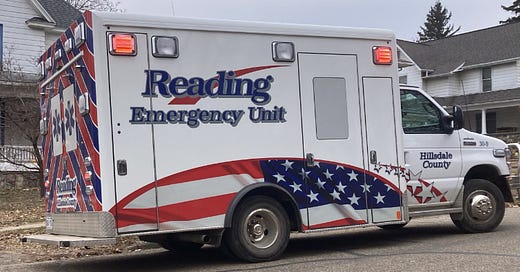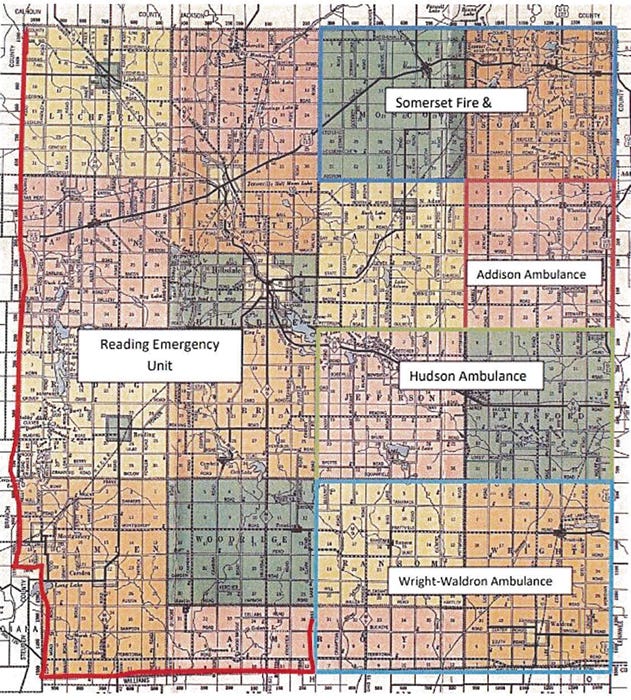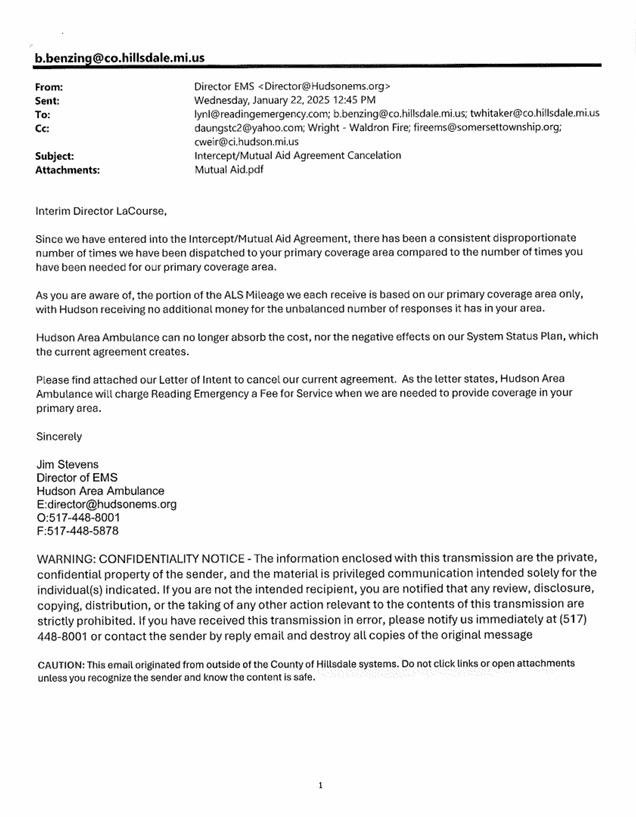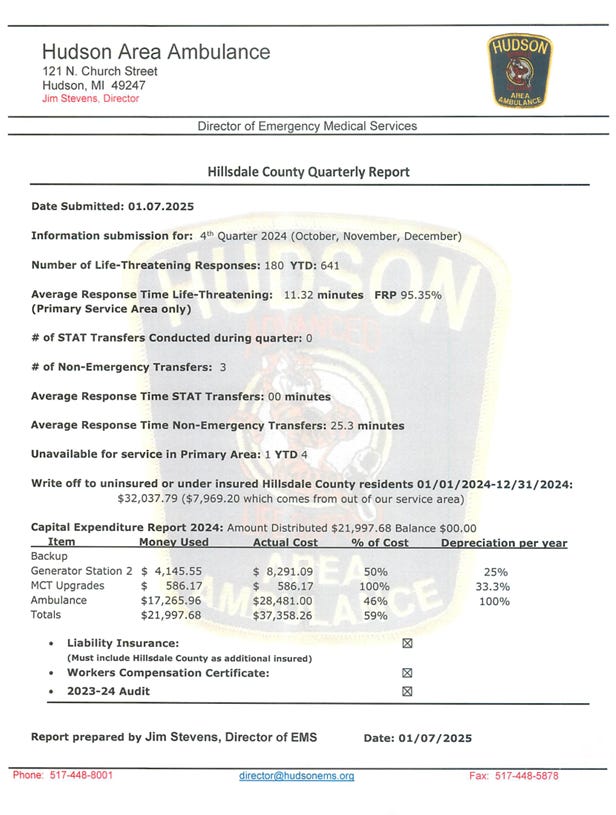Hudson Area Ambulance Ends Mutual Aid Agreement with Reading Emergency Unit
Hillsdale County Commissioners Authorize Attorney to Write Letter Suspending Hudson’s Millage Funding
Hudson Area Ambulance ended its mutual aid agreement with the Reading Emergency Unit, effective midnight February 9th, 2025.
Hudson Area Ambulance (HAA) EMS Director Jim Stevens and Hudson City Manager Charles Weir signed a letter dated January 22, 2025, that made the announcement. An email attached to the letter stated the cause of the termination.
“Since we have entered into the Intercept/Mutual Aid Agreement, there has been a consistent disproportionate number of times we have been dispatched to your primary coverage area compared to the number of times you have been needed for our primary coverage area,” Stevens wrote in a letter to Lyn LaCourse, the interim director of the Reading Emergency Unit (REU).
The Hillsdalian reached out to LaCourse, but she declined to comment. Stevens did not respond to a request for comment.
The county government’s contract with the five ambulance services—Addison, Hudson, Reading, Somerset, and Wright-Waldron—requires them to respond to emergencies when they have the closest first responders, even if the calls fall outside their primary coverage area.
Text of the contract was provided to the Hillsdalian by District 4 Commissioner Brad Benzing, who sits on the county’s ambulance contracts committee and works as a part-time Advanced Emergency Medical Technician:
“Contractor shall at all times during the Term of this Agreement maintain Mutual Aid Agreements with other ambulance service providers to provide availability within the Primary Service Area. Should Contractor be unable to respond immediately to a call within the Primary Service Area, Hillsdale County Central Dispatch will notify the nearest available ambulance service to respond to the call per their dispatch procedures.”
Under the mutual aid agreement, the ambulance services do not charge each other for these responses, except when agencies provide higher levels of emergency care.
HAA and REU, for example, provide Advanced Life Support (ALS) for Wright-Waldron, which only has licensing for Basic Life Support (BLS). They both charge for ALS coverage. Before HAA revoked the mutual aid agreement, it would charge REU when a Hudson ALS unit would assist a Reading BLS unit.
The charges for service do not necessarily violate the county’s contract, and Benzing said they “are not part of our reasons” for potentially revoking Hudson’s contract.
Stevens wrote that HAA receives “ALS Millage” money for responses in its primary coverage area but nothing for responses in REU’s primary coverage area. HAA “can no longer absorb the cost” or meet its operational objectives, according to Stevens.
Benzing said HAA interprets the contractual provision to mean that it “must have mutual aid agreements,” though not necessarily “with all the agencies.”
It is long-standing practice for ambulance agencies and fire departments within the county to all “maintain mutual aid agreements with each other,” according to Benzing.
In response to the termination of the mutual aid agreement, the Hillsdale County Board of Commissioners might cut off HAA’s millage funding.
The contract stipulates that “material failure to comply with the terms of this Agreement in whole or in part may result in the loss of millage allocation funding…”
The commissioners allocate funding to the five ambulance agencies “based on the percentage of the total millage dollars collected from each coverage area,” according to Benzing.
That’s not how the county has always given millage funds: “Previously there was a formula based on a combination of square area covered and runs from the previous years,” Benzing added.
Under the current formula, the county allocates $1,739,751.97 to the five agencies. Reading receives $1,005,497.47 for capital and operational costs or 57.8% of the county’s millage funds; Hudson receives $151,525.98 or 8.71% of the funds.
The Board requested that legal counsel Tom Thompson, draft a letter to HAA giving a “90-day notice” that Hillsdale County will withdraw from a contract with them.
District 1 Commissioner Doug Ingles said the board has not yet agreed to sign and send the notice, and he’s hopeful that the commissioners and ambulance services will find a resolution to the issue.
Ingles added that he believes the commissioners will ultimately authorize BOC Chairman Mark Wiley to sign and send the letter.
“I think they’re going to reconsider,” Ingles told the Hillsdalian. “All of the ambulance contracts will be reconsidered this summer. By June or July, our personnel committee will begin the process of renegotiating all the contracts, and in the course of renegotiating I believe all the ambulance services will be fulfilled.”
“My first concern is providing service for residents of Hillsdale County,” Ingles continued. “Ambulance service must be had. There’s not a commissioner who disagrees with that statement.”
On its website, HAA says it serves two townships in Hillsdale County—Jefferson and Pittsford—and several municipalities in Lenawee County: Hudson Township, the City of Hudson, Dover Township, Medina Township, and the Village of Waldron.
The REU serves the “townships of Adams, Allen, Amboy (West of Grass Lake Rd.), Cambria, Camden, Fayette, Hillsdale, Litchfield, Reading, Scipio, and Woodbridge as well as the cities of Hillsdale, Litchfield, Reading, and Jonesville,” according to Benzing.
Stevens and Weir wrote that HAA will charge REU “$150 per request that we are dispatched to and canceled prior to arrival,” “$250 per request that we are dispatched to and arrive on the scene,” and “$275 per request that we are dispatched to and provide a Paramedic Assist…”
It is not yet clear whether REU has agreed to the payment structure—or whether it has to agree to the payment structure. Stevens and Weir wrote that HAA will invoice REU “for the amount owed at the end of each month.”
In HAA’s quarterly update to the county commissioners, Stevens reported that his agency could not respond to 4 calls in its service area in 2024.
In the REU’s quarterly report, LaCourse reported that REU could not respond to 90 calls in its service area in 2024.
“I would like to draw attention to the fact that our unable-to-handle calls were down 36 over 2023, which I’m very pleased with,” LaCourse said at the Jan. 28 Board of Commissioners meeting.
Benzing said HAA responds to more mutual aid calls than REU because “REU covers a significantly larger area both in land size as well as population.”
The difference in mutual aid responses might also stem from REU’s decision to conduct hospital transfers, a service HAA provides sparingly.
The HAA completed only 3 non-emergency transfers in 2024. REU completed 551 transfers in 2024, comparable to its 552 transfers in 2023.
“Sometimes they’ll take someone from Hillsdale hospital to Jackson or Battle Creek,” Ingles said. “If there’s a unit out of the area, and the city of Hillsdale needs an ambulance, the next closest unit could be from Hudson Emergency.”
Joshua Paladino
You can follow the Hillsdalian on Facebook and Twitter.
Appendix:









